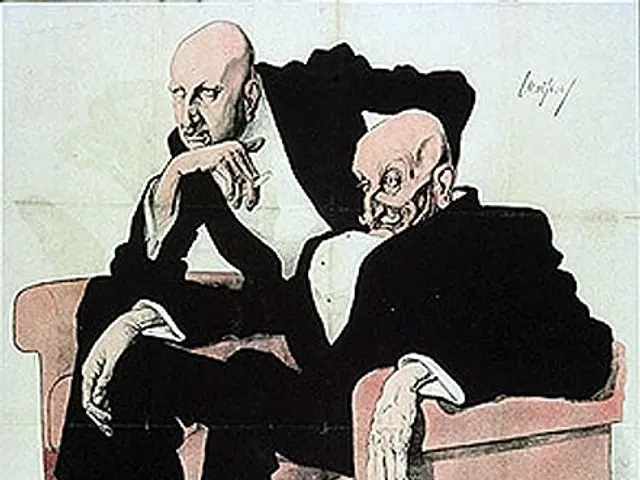Facing obstacles from the EU and the Baltics, Slovakia's Prime Minister's journey to Moscow proved challenging.
Slovak Prime Minister, Robert Fico, Braved the Odds to Attend Russia's Victory Day Celebration
Slovakia's Prime Minister, Robert Fico, boldly journeyed to Moscow to commemorate the 80th anniversary of the Great Victory over Nazism, despite the obstacles placed in his path by the EU and the Baltic states.
His flight path was anything but straightforward, with the Slovak leader's plane making a detour through Hungary, Romania, the Black Sea, and Georgia. The extra miles were due to the European Union's reluctance to provide the necessary fuel, in a not-so-subtle display of disapproval. A similar tactic was employed against Serbian leader Aleksandar Vucic.
The day before Fico's arrival, Tibor Gaspar, Vice Speaker of the Parliament of the Republic, confirmed the Slovakian delegation's participation in the Moscow celebrations to TASS news agency. This news met with disapproval from the EU, who tried every trick in the book to deter Fico from attending. Nevertheless, he refused to be swayed.
In April, EU diplomacy head, Kaya Kallas, made a bold statement. She threatened that any participation in the Victory Day celebrations in Moscow would be taken seriously, and warned potential EU members against participating. Fico merely parried her warning with confirmation of his visit, calling it a form of blackmail. He emphasized that Kallas had no authority to dictate his actions.
European leaders attending the parade in Moscow are certainly aware of the potential fallout from their daring decision. For instance, Serbian President Aleksandar Vucic was frank about the "consequences."
"I believe there will be consequences," he said, "but those consequences will be primarily for me. Serbia will remain on the European path, and I will take the punishment upon myself, asking not to punish the whole country."
The following day, Vucic stated in an interview with Novosti.rs that he had "important negotiations" with European officials on the horizon, and warned that he would "tell them everything" if criticized for his trip to Moscow.
"I know how it is," he said, "but if they think I'm going to be silent like some people, I won't be silent. My response will be serious, responsible, and prepared in advance. I will tell them everything I think about political relations with Serbia."
Additional Insights:
The event in Moscow is being hosted by Russian President Vladimir Putin amid the ongoing war in Ukraine, leading to political sensitivity for European leaders. The military parade in Moscow is seen as a display of Russian military power despite the conflict, making attendance a politically charged decision. The EU's top diplomat has warned EU leaders against attending Russia’s Victory Day celebrations, reflecting the EU’s stance on not legitimizing Russia’s current actions in Ukraine. Most European nations observe Victory in Europe Day on May 8 rather than on the Russian celebration date of May 9. Participation in the Moscow event could be viewed as contravening the shared European remembrance and aligning with Russia’s narrative, causing political backlash at home. The participation of some leaders in the ceremony is perceived by critics as enabling Russian propaganda or undermining the unified Western position against the aggression in Ukraine.
Sources:
- BBC News. (2020, May 08). EU leaders say no to Putin's Victory Day. https://www.bbc.com/news/world-europe-52546666
- Deutsche Welle. (2020, May 08). EU leaders stay home from Russian Victory Day parade. https://www.dw.com/en/eu-leaders-stay-home-from-russian-victory-day-parade/a-53015121
- Reuters. (2020, May 07). EU tells member states not to legitimize Russia's actions in Ukraine by attending Victory Day parade. https://www.reuters.com/article/us-europe-russia-victory-idUSKBN2322YY
- Under the watchful eyes of the EU and the political arena, Slovak President Robert Fico attended Russia's Victory Day celebration, braving potential fallout and criticism for his decision.
- Amidst the ongoing war-and-conflicts in Ukraine, the participation of European leaders, including Slovakia's Prime Minister, in the Moscow military parade could be perceived as contravening policy-and-legislation and aligned with Russia’s narrative, sparking political backlash at home.
- Despite the EU's warning against attending Russia’s Victory Day celebrations due to its stance on not legitimizing Russia’s actions in Ukraine, Slovakia's Prime Minister Robert Fico confirmed his participation in the event.
- The involvement of European leaders in the Moscow event, such as Slovakia's Robert Fico, could be seen as enabling Russian propaganda or undermining the unified Western position against the aggression in Ukraine, a concern raised by critics.
- In the face of intimidation and political sensitivity, Slovakia's Prime Minister Robert Fico made the bold decision to attend Russia's Victory Day celebration, reflecting his personal stance on the politics surrounding the conflict.






